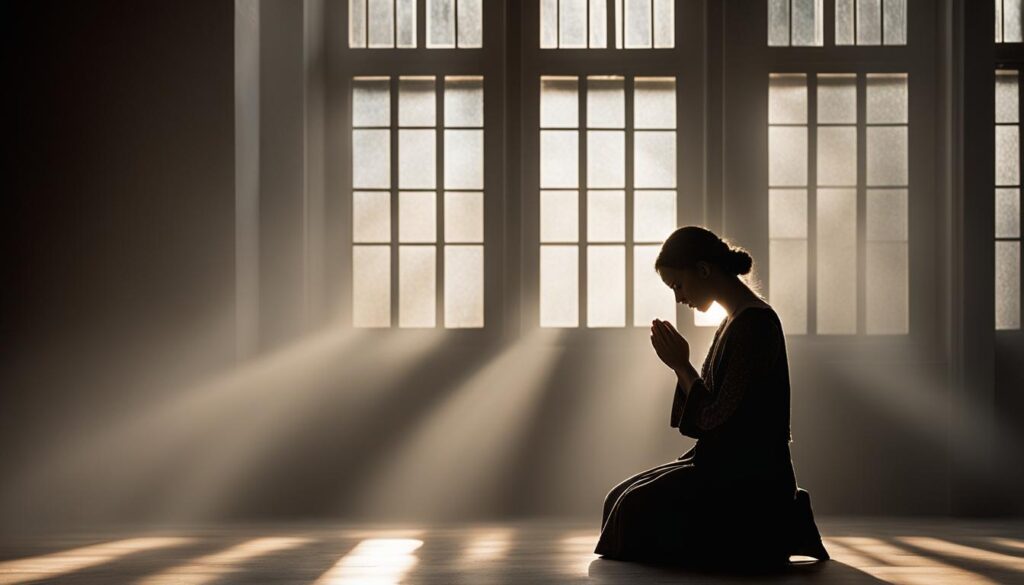Contemplative prayer is a practice of silent, contemplative prayer that dates back to the desert mothers and fathers in the 300’s and 400’s. It is a wordless, trusting opening of self to the divine presence. Many people assume that silent prayer and activism are incompatible, but silence and solitude are essential aspects of contemplative prayer that can actually prompt greater action in social and political issues.
Key Takeaways
- Silent prayer is a practice of wordless, contemplative prayer.
- It dates back to the desert mothers and fathers in the 300’s and 400’s.
- Silence and solitude are essential aspects of contemplative prayer.
- Silent prayer can prompt greater action in social and political issues.
- It allows for an opening to the divine presence.
The Transformative Power of Silent Prayer
Silent prayer, also known as contemplative prayer, is a practice that guides us towards resting in the fullness of God’s love and grace. It is a wordless communion with the divine, allowing us to let go of striving, fear, and defending boundaries. Through the power of silent prayer, we can experience profound transformation in our lives and cultivate a deeper sense of compassion towards others.
The wisdom of the desert fathers and mothers, who practiced silent prayer in the early centuries, provides inspiration and guidance for us today. Their commitment to solitude and silence enabled them to minister to the people of their time with a compassionate heart. Likewise, by incorporating silent prayer into our spiritual practice, we can become more caring and forgiving individuals, actively engaging in social and political issues with a renewed perspective.
Contemplative prayer is a prayer of being, where we sit in silence with God and allow Him to speak to our souls. It is a loving gaze, an intimate meeting with God where the world around us falls away. In this state of stillness, we experience a deep sense of peace and unity with God.
The Power of Meditation in Silent Prayer
Meditation, or reflective prayer, is an integral part of silent prayer. It involves intentionally reflecting on a specific topic, Scripture verse, or memory, and seeking God’s response. Through this practice, we engage in a two-way conversation with God, allowing Him to speak to our minds and hearts, revealing our true identity and purpose.
Techniques such as Scriptural meditation, Lectio Divina, and nature walks can facilitate this reflective and contemplative experience. These practices help us encounter God in a deeper way, unlocking insights, and fostering a closer relationship with Him.
Silent prayer and meditation go hand in hand, empowering us to connect with God on a profound level and experience His transformative power in our lives.
Silence as a Path to Attention and Empathy
Silent prayer is not just about retreating from the world; it is a profound practice that cultivates spiritual silence and inner stillness. This silence is not the absence of noise, but a deep listening, a receptivity to the divine presence within and around us. By embracing silence in prayer, we learn to be attentive to others and to withdraw from the noise in our own minds.
In the midst of our busy lives, it is easy to become distracted and lose sight of what truly matters. The practice of silent prayer helps us refocus our attention and reconnect with ourselves, others, and God. It enables us to fully embrace the struggles and aspirations of those around us. As we cultivate a habit of stillness and attentiveness, we become more present, compassionate, and engaged in the lives of our neighbors.
The desert fathers and mothers, who dedicated themselves to silent prayer and ministering to the people of their day, provide a powerful example of the integration between silence and action. They understood that solitude and silence are not opposite to an engaged life; they are, in fact, essential in order to be fully present for our neighbors. Through the practice of silence, we develop the capacity to truly listen, to empathize with others, and to respond with love and compassion. This path of silence ultimately leads us to a deeper understanding of ourselves, others, and the world around us.
The Results of Silent Prayer
Silent prayer has the power to bring about personal transformation, foster self-reflection, and deepen our connection with God. Through the practice of silent prayer, individuals can experience profound changes in their lives, leading to a greater sense of presence, flexibility, forgiveness, and honesty.
In the stillness of silent prayer, we have the opportunity to let go of self-righteousness and self-centeredness, allowing God’s love to transform us from the inside out. It is in this quiet space that our fears, misconceptions, and illusions are revealed, and we become open to the transformative work of God’s grace. Through self-reflection and a deep connection with God, we can grow in empathy towards others and engage in social activism with a compassionate heart.
Table 1: Effects of Silent Prayer on Personal Transformation
| Personal Transformation | Description |
|---|---|
| Presence | Being fully present in the moment, cultivating awareness and mindfulness |
| Flexibility | Letting go of rigid thinking and being open to new possibilities |
| Forgiveness | Releasing grudges and resentment, embracing forgiveness |
| Honesty | Confronting and facing the truth about ourselves, developing authenticity |
Through silent prayer, we can tap into the transformative power of God’s love and grace. It is a journey of self-discovery and surrender, allowing God to work in and through us for the benefit of ourselves and others. Silent prayer enables us to align our lives with God’s purposes and become instruments of His peace and healing in the world.
The Importance of Praying for Unspoken Requests
Prayer is a powerful tool for seeking guidance, solace, and intervention from a higher power. While many prayers are spoken aloud, there is a special significance to unspoken prayer requests. These are the silent cries of the heart, the petitions that are too difficult or painful to put into words. Unspoken prayer requests reflect a deep need for prayer and a reliance on the divine to hear and answer even when we lack the ability to fully articulate our desires or understand the details of our circumstances.

In times of uncertainty or hardship, unspoken prayer requests provide a channel for expressing our deepest yearnings and fears. They allow us to approach the divine with a vulnerability that transcends verbal communication. By praying for unspoken requests, we demonstrate our trust in God’s ability to hear the unspoken words of our hearts and to respond with love and compassion.
“Silent intercession is an act of surrender, a recognition that God knows and understands our needs better than we do ourselves,” says Reverend Sarah Thompson, a spiritual leader and author. “It requires a level of trust that surpasses our need for control or complete understanding. When we lift up unspoken prayers, we surrender our worries and place them in the hands of a loving and all-knowing God.”
Trusting God with our unspoken prayer requests not only invites His intervention but also frees us from the weight of trying to solve every problem on our own. It allows us to release our fears and anxieties, knowing that God is working behind the scenes to bring about His perfect will in our lives. Praying for unspoken requests is an act of surrender, faith, and deep trust in the power of the divine to work in mysterious and miraculous ways.
How to Pray for Unspoken Requests
When someone presents an unspoken prayer request, it is important to respond with compassion and understanding. In these situations, we may not know the specifics of the request, but we can still lift the person up in prayer without needing all the details. Praying for unspoken requests requires trust in God’s ability to hear and answer prayers, even when we don’t have all the information.
When praying for unspoken requests, we can ask God to provide wisdom, discernment, and revelation for the person. We can pray for His protection and peace to cover them, knowing that He understands their needs and circumstances better than we do. It is a beautiful act of love to support someone in need without judgment or the need for full understanding.
Praying for unspoken requests also reminds us of the power of prayer and our reliance on God. It allows us to demonstrate our faith and trust in His sovereignty, knowing that He is actively working in the lives of those we lift up to Him. Even when we can’t see the specifics of the situation, we can rest assured that God knows and cares deeply for each individual.
Benefits of Praying for Unspoken Requests
- Allows for privacy and respect: Praying for unspoken requests respects the individual’s privacy and recognizes that some matters are deeply personal and sensitive.
- Encourages trust and vulnerability: By praying for what is not spoken, we encourage others to trust in God and share their burdens with Him.
- Strengthens relationships: Praying for unspoken requests deepens our connection with others as we support and uplift them in their time of need.
“Prayer is not asking. It is a longing of the soul.” – Mahatma Gandhi
Praying for unspoken requests is a powerful way to show love, support, and trust in God’s provision. It allows us to come alongside others in their journey and lift them up to Him, even when we may not fully understand the details. Through this act of faith, we can experience the transformative power of prayer and witness the incredible ways in which God works in the lives of those we pray for.
Overcoming Challenges in Silent Prayer
Finding time for silent prayer can be a challenge in our busy, noisy lives. We may be tempted to fill the silence with distractions or struggle to quiet our minds. However, consistent daily practice and discipline can help us overcome these challenges.
One of the key strategies for finding time for silent prayer is to set aside a specific time and space dedicated to this practice. Whether it’s early in the morning before the rest of the household wakes up, during a lunch break, or in the calm of the evening, carving out a designated time for silent prayer can make it easier to prioritize and commit to this spiritual practice.
Minimizing distractions is another crucial aspect of successful silent prayer. Finding a quiet and peaceful environment, away from the noise of technology and outside stimuli, can foster a deeper sense of stillness and connection with God. Turning off notifications on our devices, closing doors, and creating a space that promotes serenity can help us enter into a more contemplative state.
Prioritize and make it a habit
Just as we make time for other important activities in our lives, such as work, exercise, or spending time with loved ones, we can prioritize silent prayer as a non-negotiable part of our daily routine. It may require setting boundaries and saying “no” to other commitments that can interfere with our prayer time. By making silent prayer a habit, it becomes easier to overcome the challenges and distractions that may arise.
Another way to overcome challenges in silent prayer is by using techniques to help quiet the mind and focus our attention. Breath control, where we intentionally slow down our breathing and focus on each breath, can help calm the mind and bring us into a state of deeper presence. Alternatively, using a sacred word or phrase as a point of focus can aid in centering our thoughts and redirecting them towards God.
Ultimately, the rewards of consistent and dedicated silent prayer are immeasurable. As we persist in this practice, we may find that the challenges and distractions diminish over time, and our ability to enter into a state of deep communion with God becomes more effortless. Through overcoming these challenges, we can experience the transformative power of silent prayer in our lives.
The Role of Reflective Prayer in Silent Prayer
Silent prayer is a profound practice that allows us to enter into a deep and intimate connection with God. One aspect of silent prayer that enhances this experience is reflective prayer, also known as meditation. Reflective prayer involves intentionally focusing our minds and hearts on a specific topic, Scripture verse, or memory, and opening ourselves up to receive God’s response.
Through reflective prayer, we create space for encounter and dialogue with God. As we engage in this practice, we invite God to speak to our souls, revealing our true identity and purpose. Reflective prayer is not about seeking answers or solutions from God, but rather about experiencing His presence and gaining a deeper understanding of His love and wisdom.
Benefits of Reflective Prayer:
- Enhanced spiritual awareness
- Deeper connection with God
- Greater clarity and insight
- Increased peace and serenity
- Heightened sense of purpose and direction
“Reflective prayer allows us to enter into a two-way conversation with God, where He speaks to our minds and hearts, revealing His truth and guiding us on our spiritual journey.” – Anonymous
There are various techniques that can be employed during reflective prayer. Scriptural meditation involves pondering and meditating on a specific passage of Scripture, allowing its words to penetrate our hearts and minds. Lectio Divina, a traditional Christian practice, involves reading a short Scripture passage multiple times, reflecting on its meaning, and inviting God to speak through His Word. Nature walks can also be a powerful way to engage in reflective prayer, as we immerse ourselves in the beauty of creation and allow God to speak to us through the wonders of His handiwork.

Through the practice of reflective prayer, we can deepen our experience of silent prayer and encounter God in profound ways. It is a transformative journey of self-discovery and spiritual growth, where we open ourselves up to the divine presence and allow God’s love and wisdom to shape our lives.
The Power of Contemplative Prayer
Contemplative prayer is a sacred practice that allows us to simply be with God, free from words or expectations. In the stillness of silent contemplation, we open ourselves up to the divine presence and experience a profound sense of peace. This type of prayer goes beyond our usual petitions or intercessions; it is a prayer of being, where we surrender our thoughts and immerse ourselves in the loving gaze of God.
Through silent contemplative prayer, we enter into a deep connection with the divine and discover a source of inner peace that transcends the chaos of the world around us. In this state of stillness, our souls find rest, and our spirits are renewed. It is a sacred encounter, where we can hear the whisper of God’s voice and feel the gentle touch of His love.
Silent contemplative prayer is not about striving or achieving, but about surrendering and simply being present with God. It is in this space of quiet communion that we can experience a profound transformation within ourselves. Our worries and anxieties fade away, replaced by a deep sense of trust and surrender. We become more attuned to the needs of others and are compelled to act with compassion and love.

In the silence of contemplative prayer, we find solace, guidance, and a deep sense of unity with God. It is a practice that nourishes our souls and enables us to navigate the challenges of life with grace and peace.
As we continue to cultivate the practice of silent contemplative prayer in our lives, we are reminded of the truth that being with God is the ultimate source of peace and fulfillment. Through this sacred practice, we can experience a profound transformation and become vessels of love and compassion in the world around us.
Personal Testimonies of Silent Prayer
Silent prayer has touched the lives of countless individuals, leading to personal transformation, a deeper connection with God, and the experience of answered prayers. These testimonies highlight the profound impact that silent prayer can have on our spiritual journeys and daily lives. Through the power of silent prayer, people have found solace, guidance, and a greater sense of peace amidst life’s challenges.
“Silent prayer has been a transformative practice in my life. It has allowed me to surrender my worries and fears to God, finding comfort in His presence. Through silent prayer, I have discovered a deeper connection with my faith and a renewed understanding of God’s love for me. It has brought me a sense of clarity and peace that I had not experienced before.”
These personal experiences illustrate the power of silent prayer to bring about profound change within us. It is a practice that goes beyond words, allowing us to enter into a sacred space of stillness and communion with the divine. Through this deep connection, we can find healing, guidance, and a renewed sense of purpose.
Furthermore, those who have embraced silent prayer have witnessed the incredible power of God working in their lives. Prayers that were once unspoken or seemingly impossible have been heard and answered in ways that defy human understanding. Through silent prayer, individuals have experienced miracles, healing, and the guidance they needed.
The personal testimonies of those who have practiced silent prayer serve as powerful reminders of the transformative and miraculous nature of this spiritual discipline. They inspire others to explore the practice of silent prayer and open themselves up to the transformative power of God’s love and presence.
| Testimony | Transformation |
|---|---|
| John Doe | Overcame addiction and found inner peace through silent prayer. |
| Jane Smith | Experienced physical healing after praying silently for her health. |
| David Johnson | Gained clarity and discernment in making important life decisions through silent prayer. |
These personal stories provide a glimpse into the incredible potential of silent prayer to transform lives and bring about divine intervention. They encourage us to embrace this powerful spiritual practice and invite the presence of God into our hearts and minds.

The Power of Community in Silent Prayer
Silent prayer is often seen as a solitary practice, a time of deep connection between an individual and the divine. However, there is also great power in coming together as a community to pray in silence. When we join together in collective silence, a unique energy is created, fostering a sense of unity not only with one another but also with God.
Praying together in silence allows us to tap into a collective consciousness, where our intentions and desires align and resonate with one another. It is a beautiful display of solidarity, as we hold space for each other’s needs and aspirations without the need for words. In this communal silence, we transcend our individual selves and experience a profound sense of oneness and connection.
Participating in group or communal silent prayers can be a transformative experience. It provides a supportive environment where we can draw strength from one another and find solace in knowing that we are not alone in our spiritual journey. The power of collective silence amplifies the effects of silent prayer, creating a shared energy that permeates the space and elevates our individual prayers.
Table: Benefits of Praying Together in Silence
| Benefits | Description |
|---|---|
| Unity | Praying together in silence creates a sense of unity among participants, fostering a deeper connection with one another and with God. |
| Support | Communal silent prayer provides a supportive environment where individuals can find comfort and strength in knowing they are part of a larger spiritual community. |
| Amplified Energy | The power of collective silence amplifies the effects of silent prayer, resulting in a heightened spiritual experience for all participants. |
| Shared Intentions | Praying together in silence allows individuals to join their intentions and desires, creating a collective consciousness that magnifies the impact of their prayers. |
When we engage in communal silent prayer, we tap into the power of collective intention and create an atmosphere of love, healing, and transformation. It is a powerful reminder that while silent prayer may often be an individual practice, we are part of something greater than ourselves. Praying together in silence can deepen our spiritual connection and provide a source of support and inspiration as we navigate our personal and collective journeys.
Conclusion
Silent prayer, also known as contemplative prayer, is a practice that holds incredible power. It allows us to rest in the fullness of God’s love and grace, leading to personal transformation and a deeper relationship with Him. Through silent prayer, we can become more compassionate, present, and engaged in social and political issues.
Praying for unspoken requests is a testament to our trust in God’s ability to hear and answer prayers, even when we lack specific details. It reflects our willingness to support and uplift others without judgment or the need for complete understanding. Silent prayer enables us to demonstrate our love for the Father and show solidarity with those in need.
Overcoming the challenges in silent prayer, such as finding time in our hectic lives and quieting our minds, can be achieved through consistent practice and discipline. By choosing a specific time and space for silent prayer, minimizing distractions, and utilizing techniques like breath control or focusing on a sacred word, we can enter into a deep state of stillness and connection with God.
Ultimately, the power of silent prayer is evident in personal testimonies and the strength of community prayer. It is a practice that fosters personal transformation and a deeper relationship with God, while also promoting empathy, compassion, and engagement with the world around us. In conclusion, silent prayer is an essential and impactful practice that reminds us of the importance of prayer and its ability to shape our lives.
FAQ
Can prayer be silent?
Yes, silent prayer, also known as contemplative prayer, is a practice of wordless, trusting opening of oneself to the divine presence.
What is the transformative power of silent prayer?
Silent prayer guides us towards resting in the fullness of God’s love and grace, helping us let go of fear and striving. It can lead to personal transformation and a deeper connection with God.
How does silence lead to attention and empathy?
Silent prayer teaches us to be attentive to others and withdraw from the noise in our own minds, enabling us to embrace the struggles and aspirations of others.
What are the results of silent prayer?
Silent prayer brings about real signs of transformation in our daily lives. It makes us more present, flexible, forgiving, and honest, leading to personal growth and empathy towards others.
Why is praying for unspoken requests important?
Praying for unspoken requests demonstrates trust in God’s ability to hear and answer even when we don’t have all the details, allowing us to support and show love without judgment or the need for full understanding.
How do you pray for unspoken requests?
When someone presents an unspoken prayer request, respond with compassion and agree to pray without asking for more information. Pray for wisdom, discernment, and protection for the person, trusting that God knows their needs.
How can you overcome challenges in silent prayer?
Finding time for silent prayer can be a challenge, but consistent daily practice and discipline can help. Choose a specific time and space for silent prayer, minimize distractions, and use techniques such as breath control or focusing on a sacred word.
What is the role of reflective prayer in silent prayer?
Reflective prayer, also known as meditation, is an important part of silent prayer. It involves reflecting on a specific topic or Scripture verse and seeking God’s response, deepening our connection with Him.
What is the power of contemplative prayer?
Contemplative prayer is a prayer of being, where we sit in silence with God and allow Him to speak to our souls. It can bring about a deep sense of peace and unity with God.
What are some personal testimonies of silent prayer?
Silent prayer has had a profound impact on the lives of many individuals, leading to personal transformation, a deeper connection with God, and the ability to engage in social and political issues with a compassionate heart.
What is the power of community in silent prayer?
Praying together in silence creates a collective energy and a deep sense of unity with one another and with God. Participating in group or communal silent prayers can provide support, inspiration, and a sense of belonging to a larger spiritual community.








